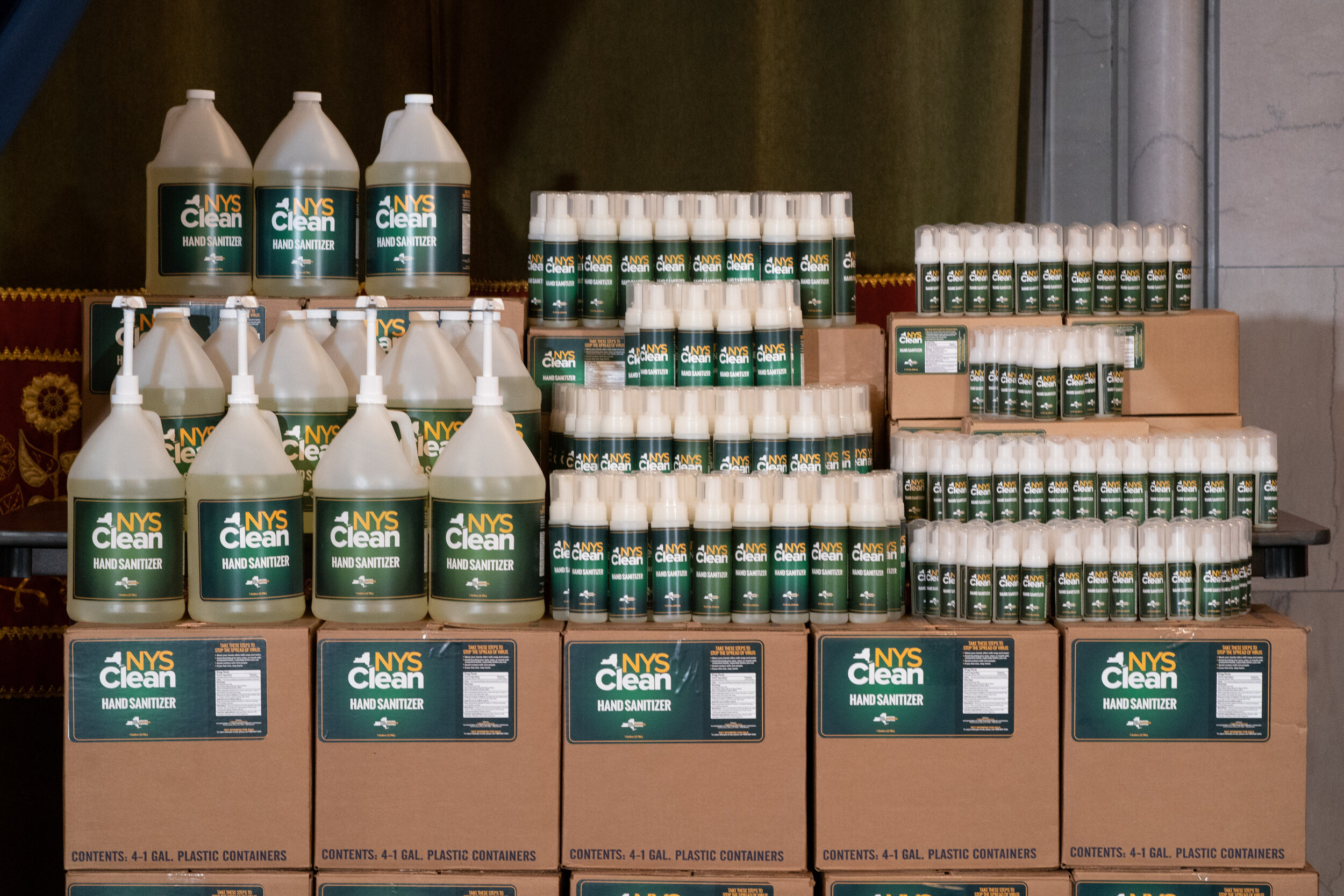Vulnerable NYCHA tenant leaders forced to go door-to-door squirting state-issued sanitizer in coronavirus fight
/Gov. Andrew Cuomo pledged to provide hand sanitizer to NYCHA tenants. The state dropped off gallon jugs for tenant associations to figure out how to distribute. AP Photo/Marina Villeneuve
By David Brand
Carol Wilkins, the president of the Ravenswood Houses Tenants Association, was relieved when she first found out that Gov. Andrew Cuomo had fulfilled his pledge to send masks, gloves and hand sanitizer to her sprawling public housing complex in Astoria.
But then Wilkins saw the inventory.
The state had dropped off several large boxes, each containing four industrial-sized jugs of hand sanitizer instead of individually packaged personal-use squirt containers. It was up to Wilkins, 69, and a team of volunteers to figure out how to squeeze the liquid into smaller containers and distribute it to thousands of tenants living in the 31-building complex.
“They just sent it to our development and the manager called me up and said, ‘Come down and get it.’ There was no plan,” Wilkins said. “[The state] never talked to us about it first”
Rather than dispense the sanitizer in the lobby and force residents to congregate in one place, Wilkins and a few other tenants association members — nearly all of whom are older adults — decided that they would visit each of the 2,167 apartments across the public housing campus, hand over the masks and pump the liquid from the gallon jugs into individual containers provided by residents.
“We’re just passing the mask, passing the hand sanitizer and we tell them to have a bottle ready so we can give them four pumps — bam, bam, bam — we’re out,” she said.
Tenants have presented an array of containers to capture their allotted sanitizer.
“Some people have bottles that already had hand sanitizer in them, some people have empty water bottles, some people have baggies, some people come out with bottles or jars, some people have takeout containers,” Wilkins said.
Gov. Andrew Cuomo showcased the state’s hand sanitizer — produced by prison inmates — at a press conference in March. Photo via Governor’s Office/Flickr
During the transition from the jug to the small vessels, the liquid “spills all over so at least it’s killing the germs,” she joked.
But Wilkins and the other volunteers are seriously worried about exposing themselves or their neighbors to the coronavirus. She has asthma and high blood pressure — “all the no-nos” that exacerbate the impact of COVID-19, she said — so she has decided to sit out the distribution process. She is concerned her friends will get sick while doing the “very admirable” work of sharing supplies with their neighbors
“It has us between a rock and a hard place because we’re exposed. I’m scared,” she said. “And NYCHA feels it’s not their problem.”
On April 22, a few days after Cuomo’s pledge, Mayor Bill de Blasio announced that the city would also provide personal protective equipment and hand sanitizer to NYCHA tenants.
Despite the aligned efforts, NYCHA and the state have not coordinated distribution of the hand sanitizer, said Councilmember Jimmy Van Bramer, who represents the Ravenswood and nearby Queensbridge Houses, which have the same problem.
“It’s absolute insanity,” Van Bramer said.
“You can’t just drop all the supplies into the office and tell the tenant association leadership — virtually all of whom are senior citizens, some super senior citizens — that they’re the ones giving out hand sanitizer,” he added.
NYCHA and Cuomo’s Office did not respond to emails seeking information and responses for this story.
SOUTH JAMAICA HOUSES RESIDENTS ASSOCIATION PRESIDENT MANNY MARTINEZ STANDS IN FRONT OF THE DEVELOPMENT’S COMMUNITY CENTER. EAGLE FILE PHOTO BY PHINEAS RUECKERT.
The lack of guidance for how to dispense individual servings of hand sanitizer isn’t limited to public housing complexes in Western Queens. It’s a system-wide issue, said South Jamaica Houses Resident Association Manny Martinez.
“There was no logistical planning. They just dropped this on our lap,” said Martinez, who found out that a shipment of protective gear and sanitizer arrived Thursday, when another resident saw workers unloading a truck. The South Jamaica Houses property manager called him the next day, he said.
Martinez said he now has to figure out how to distribute 108 gallons of sanitizer among tenants in the complex’s 1,040 apartments. NYCHA told him that staff could not assist in the effort, he said.
“That means I have to interact with the residents and expose myself or others,” he said. “Without coordination from NYCHA, it is impossible to ensure that everyone has access.”
The coronavirus has had a disproportionate impact on Black and Latino New Yorkers, who account for the majority of NYCHA tenants. Ensuring that every public housing tenant safely obtains protective equipment and sanitizer is a civil rights issue, Martinez said.
“This is a barrier to life-preserving tools that have been promised by the governor and it’s not outside the pattern of the governor’s response to residents of NYCHA,” he said, noting the lack of new funding in Cuomo’s executive budget.
Back at Ravenswood, tenants association member Eddie Cadiz also wondered why the city and state could not coordinate distribution.
“NYCHA should send a letter to each tenant saying, ‘This time of day come to the lobby and get your mask, get your sanitizer,” he said.
Forcing the tenant association to distribute door-to-door “exposes people even further” to the coronavirus, he added.
Cadiz said he stocked up on his own supplies because he did not think he could count on the state or city to step up for residents of public housing.
“I got my own stuff because by the time NYCHA gets to me, there will be a new illness,” he said.
Correction: A previous version of this article referred to the state-issued sanitizer as “gel” but it is actually an alcohol-based liquid.






